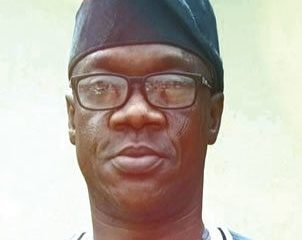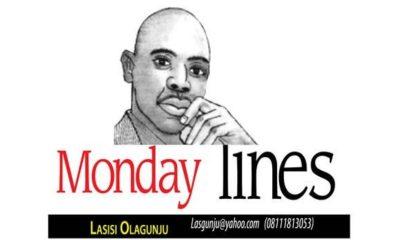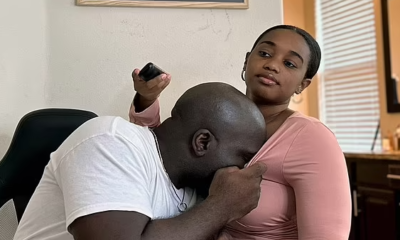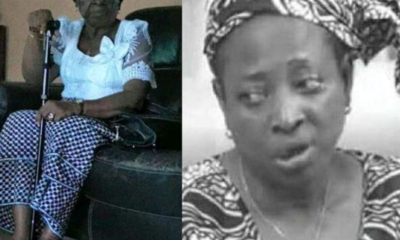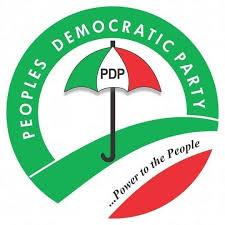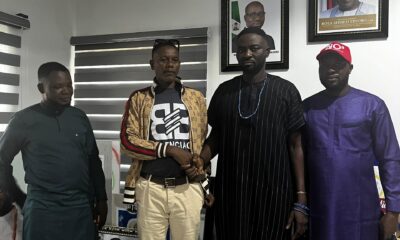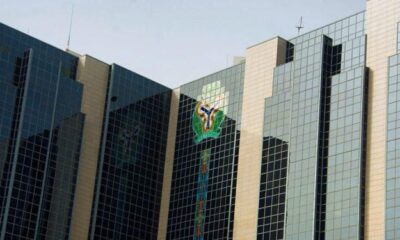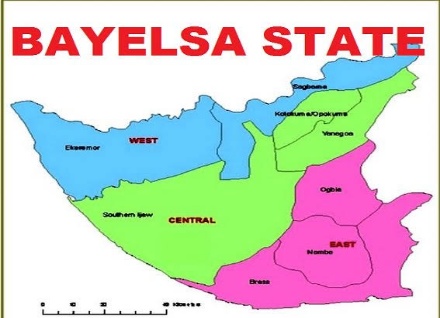News
OPINION: Travelling Through Nigeria In Tinubu’s Yacht
Published
6 months agoon
By
Editor
Tunde Odesola
By the Rivers of Babylon, there I sat down; yeah, I wept, when I remember N-i-g-e-r-i-a. Verily, verily I say unto you, these words that I write, are words of redemption and wisdom. Therefore, I beseech you, brethren, to keep these words in your hearts, inscribe them in stones and scribble them on scrolls.
I exhort thee, keep the stones and scrolls, do not hide them under the bushel, set them on the hill for light to shine on them and bring people to know the truth, for only the truth shall set the land free.
Like the hands of a sinner spread wide on the cross, River Niger and River Benue divide the land called Nigeria into three unequal communities of the North, West and East. The Fulani dominate the North, the Yoruba have the West, and the Igbo populate the East. Each region and people had their strengths and weaknesses. The land knew peace.
But when political iniquity became official, and the supplications of the oppressed minorities rose to the ears of the Most High God, the portion of the land that flows with oil, milk and honey became gazetted as the Niger Delta, a vast treasure that was initially part of the eastern and western regions.
And the Lord regretted creating man because the heart of man was perpetually evil. So, the spirit of the Lord hovered upon the face of the waters, inspiring patriots to call traitors to repentance and justice.
It came to pass that there arose a mutiny within the Nigerian Army when some young, idealistic officers, mostly from the East, toppled the civilian government of Alhaji Tafawa Balewa, a northerner, who was killed, and an easterner, Major General Johnson Aguiyi-Ironsi, ruled in Balewa’s stead. The January 1966 coup broke the embankment that had dammed the river of hate and suspicion from flooding the country.
FROM THE AUTHOR: OPINION: Ellupee Lawmakers Refuse Shishi, Collect Exotic Cars
Six months later, a countercoup executed mainly by Hausa-Fulani soldiers was nicknamed a revenge coup, in which Aguiyi-Ironsi was killed. The fallout of the countercoup fed fodder to the cannons of a Civil War, which boomed between July 6, 1967, and January 13, 1970, as crazed soldiers played football with three million Igbo skulls felled by battlefield bullets, ethnic cleansing and starvation.
In anger, the Lord God of Host turned his eyes away from the people and the land, and He allowed jackboots in military uniforms to chastise them with scorpions because the innocent blood of coup victims and Biafrans refused to drain into the earth.
Here are the names and surnames of the rulers of Nigeria after the Civil War, in order of their ascension. Yakubu, the son of Gowon; Murtala, the son of Mohammed; Olusegun, the son of Obasanjo; Shehu, the son of Shagari; Muhammadu, the son of Buhari; Ibrahim, C the son of Babangida; Ernest, the son Shonekan; Sani, the son of Abacha; and Abdulsalami, the son of Abubakar. All these rulers ruled in the Old Testament.
But Babangida was wiser than a snake. Indeed, he was a deceiver extraordinaire. His bright smile has the cooling effect of iodine on a fresh wound, before the stinging pain. For is it not written that Babangida’s regime was the bloodiest in the 63-year history of Nigeria as many soldiers died in alleged coup plots while 163 senior soldiers died in a plane crash on September 28, 1992?
“They got me,” were the last words of Dele Giwa, the Editor-in-Chief of Newswatch magazine after a letter bomb blew open his entrails in his Ikeja home on October 19, 1986, shutting his eyes in brutal death. Giwa’s deputy and comrade-in-pen, Ray Ekpu, described the killing as ‘state assassination’, adding that the Friday preceding the Sunday Giwa received the letter bomb, he (Giwa) was grilled by the State Security Service, which accused him of ‘arms importation, planning a socialist revolution, doing a follow-up story on Commodore Ebitu Ukiwe, who had been removed by President Babangida, and planning to employ a former Lagos Police Public Relations Officer, Alozie Ogbugbuaja, who said the expertise of the Nigerian military top brass was in drinking pepper soup and planning coups. Ekpu said Giwa was only guilty of one of the four allegations, that is, planning to employ Ogbugbuaja.
FROM THE AUTHOR: OPINION: When I Forged My Exam Record
After he annulled the June 12 presidential election won by MKO Abiola in 1993, and the backlash thereof was unbearable, Babangida planted on the throne, Sonekan, who was blown out of power by the hot air from the nostrils of Abacha. Abacha ruled for just four and a half years before karma handcuffed and flung him into the bottomless pit reserved for the shameless. Nothing confirms the looting of public treasury by successive Nigerian governments than the unending return of billions of dollars stashed in foreign countries by Abacha. Remember, Abacha spent just four and a half years in the vault and he became the Glutton of All Time!
I am a full-blooded Nigerian. I have no family roots in Niger Republic like Buhari, or ancestrial link to Mauritania like Peter Obi’s presidential running mate, Datti Baba-Ahmed. Nigeria is my only home. I feel anguish daily when my hands hit the bottom of my empty trouser pockets, groping for unavailable naira, whose value equals the clap of thunder to the deaf.
Hope is dead in Nigeria’s New Testament. The testament of the latest Republic. Obasanjo’s civilian government opened the floodgates of corruption in the electricity sector, the privatisation process and the National ID card scam. Governments, thereafter, stirred the broth and served the booty, strangulating the economy.
Sadly, the chickens are back home to roost. Now, everywhere you turn, cries of economic hardship have taken over the land even within the Emi Lokan ruling party. Curses have replaced compliments. But me, I thank God I still have my mind intact. Many Nigerians don’t. Whenever I see any of the corrupt clique of 99.9% Nigerian leaders – former or present – I say in my mind, “Look at this one, it’s only God that knows how much of Nigeria’s money that this thief has stolen. Ole!” Treasury looters know what Nigerians think of them but they’re just shameless and unperturbed because the river of justice in the land has frozen.
The economy is gasping. Fathers have turned to beggars, and wives have turned to harlots. Children are deflowered for a bite of Gala. Commodity prices reside in the sky. Yet, our President buys a $6.1m yacht, and our senators and representatives crave N58bn SUVs, all living the life depicted in Luke 12:19, “And I will say to my soul, ‘Soul, you have plenty of grain laid up for many years. Take life easy; eat, drink and be merry.’”
FROM THE AUTHOR: OPINION: My Children Won’t Suffer What I Suffered
Brethren, look closely at the pictures of their merriment, the voter is missing. So, tell me, what does it profit a voter, who supports bàráwò candidates, and is dehumanised after elections?
When the earth brimmed with iniquity, Noah stood up to be counted for righteousness. He built a three-deck ark with gopherwood and ushered in two of every kind of living creature, including the members of his family.
When Nigeria brimmed with escalating prices of goods, soaring foreign debts, double-digit inflation, and starvation, Tinubu, lawmakers, ministers and members of the ruling class tightened the belts harder on the masses. To cater for the insatiable gluttony, they have demanded underfunded federal universities to submit 40% of their meagre IGR to a federal purse which, characteristically, would lack accountability.
You don’t need righteousness to enter the presidential yacht. You need a brainless head and a soulless body. You need to make money your god and not flinch to proclaim all the seven colours of the rainbow black – like our judges who sell elections like pure water hawkers in traffic snarls, smashing and grabbing, kówó sá ti pe.
I thank God I have my mind intact. In my mind, I can see Noah in his robe, hewing wood and fetching water, sweating, sawing and nailing. I can see him clutching a bell, trekking the length and breadth of the land, calling the people to come and enter the ark. Noah’s ark is for salvation.
Tinubu’s yacht is for enslavement. He doesn’t need gopherwood or God’s directive to build his yacht, he needs dollarhood. He doesn’t need the masses inside his toy, he needs his people.
Barely a month left in 2023, the year of his election, Tinubu has bought a yacht for himself, SUVs for lawmakers, with the $2.176 trillion 2023 Supplementary Appropriation Act he signed a few days ago, and the masses are left wondering ‘is this not the ‘son’ of Abibatu Mogaji, who claims to build modern Lagos? Emi Lokan doesn’t only mean ‘it’s my turn’; it also means ‘I’m badly hit’. Ask the Yoruba.
True, it’s Tinubu’s turn but the masses are badly hit. True.
Since Tinubu performed so well in his first year, may he sail safely in his yacht and perform much better next year.
Amen.
You may like


OPINION: Minister Tahir Mamman And His Varsity Age Limit


OPINION: Petrol Pains, Wilderness Wanderings


OPINION: Mike Adenuga’s 71 Resilient Steps


Bello And Enenche: A Tale Of Two Lions [OPINION]


OPINION: Why Were Miyetti Allah And Tinubu’s Iyaloja In Ibadan?


OPINION: Bobrisky’s Masque, Yahaya Bello’s Boa
News
Reign Of Terror: Again, Gunmen Strike In Enugu, Kill Four Policemen, FRSC Officials In Fresh Attack
Published
1 hour agoon
May 12, 2024By
Editor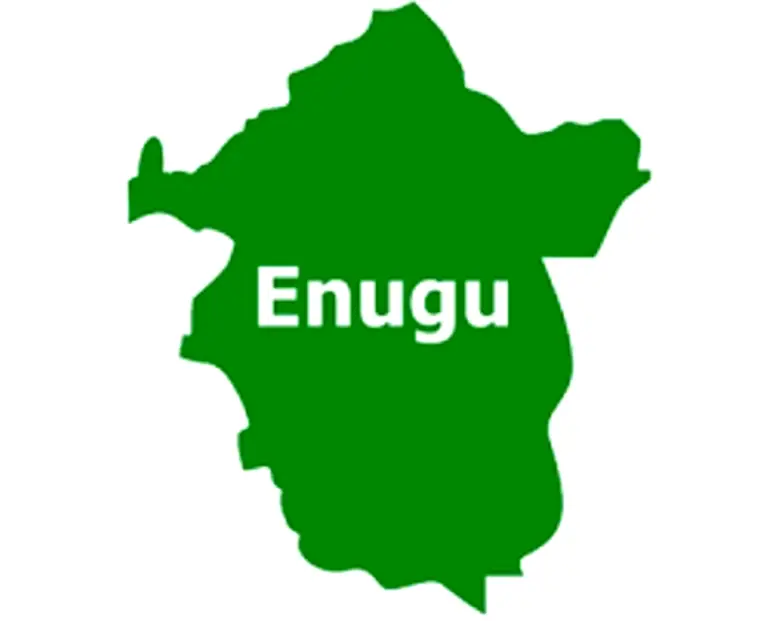
There was a reign of terror at Orba and Eha-Alumona in Udenu and Nsukka Local Government Areas of Enugu State, respectively; as gunmen attacked two operatives each of the Nigeria Police Force and Federal Road Safety Corps on Saturday.
The attack came barely 24 hours after two policemen on a stop-and-search duty were attacked and killed on Friday by some gunmen in the state metropolis, less than a kilometre from the Government House.
It was gathered that the latest attack started from the Premier Junction at Eha-Alumona in Nsukka LG and proceeded to the Army checkpoint at Orba in Udenu LG around 4 pm.
READ ALSO: Customs Intercepts N10m Worth Petrol En Route Cameroon Illegally
The four personnel were killed in the onslaught while others escaped with various degrees of injury.
The hoodlums also attacked and set ablaze a Hilux van belonging to the traditional ruler of Egali Amalla Community in Udenu LG, Patrick Eze, popularly known as Igwe Waziri.
The monarch, who was reportedly caught, in the web of the attack, miraculously escaped unhurt.
The gunmen also burnt an FRSC van during the carnage.
READ ALSO: Nine-year-old Stabs Pupil,10, To Death On While Returning From School In South Africa
Meanwhile, when our correspondent contacted the state Commissioner of Police Kanayo Uzuegbu, for his reaction to the incident, he said, “I am not aware of the incident. Please contact the Police Public Relations Officer on that.”
However, efforts to get the command’s spokesperson, Daniel Ndukwe, were unsuccessful as he neither responded to the calls nor text messages as at the time of filing this report.
Governor Peter Mbah of Enugu State had vowed to apprehend the assailants who killed two policemen on Friday with all the resources available to the state government.
PUNCH
News
SERAP, BudgIT, Others Drag CBN To Court Over Cybersecurity Levy
Published
2 hours agoon
May 12, 2024By
Editor
The Socio-Economic Rights and Accountability Project; a not-for-profit organisation, BudgIT, and 136 concerned Nigerians have filed a lawsuit against the Central Bank of Nigeria “over its failure” to withdraw the cybersecurity levy.
In what was described as an “unlawful circular,” the plaintiffs in the suit number FHC/L/CS/822/2024 filed last Friday at the Federal High Court, Lagos State, asked the court to determine “whether the CBN circular dated 6th May 2024, directing financial institutions to deduct from customers’ accounts a cybersecurity levy is unlawful and therefore ultra vires the CBN.”
This is contained in a statement issued by SERAP’s Deputy Director, Kolawole Oluwadare, made available to newsmen on Sunday.
Last Monday, through a circular, the apex bank ordered all commercial, merchant, non-interest, and payment service banks, among others. operating in the country to start charging a cybersecurity levy on transactions.
READ ALSO: Tinubu Bows To Pressure, Orders CBN To Suspend Implementation Of Cybersecurity Levy
The CBN noted that, in compliance with the enactment of the Cybercrime (Prohibition, Prevention, etc.) (Amendment) Act 2024 and under the provision of Section 44 (2)(a) of the Act, a levy of 0.5 per cent (0.005) equivalent to a half per cent of all electronic transactions value by the business specified in the Second Schedule of the Act, is to be remitted to the National Cybersecurity Fund which shall be administered by the Office of the National Security Adviser.
“The levy shall be applied at the point of electronic transfer origination, then deducted and remitted by the financial institution. The deducted amount shall be reflected in the customer’s account with the narration, ‘Cybersecurity Levy.” the circular stated.
Although, President Bola Tinubu had directed the CBN to suspend the implementation of the controversial cybersecurity levy policy and ordered a review, the plaintiffs asked the court to determine whether the apex bank’s directive “are not in breach of sections 14(2), 44(1) and 162(1) of the Nigerian Constitution 1999 [as amended], and therefore unconstitutional, null, and void.”
They also demanded that the “CBN, its office, agents, privies, assigns, or any other persons acting on its instructions from enforcing the circular dated 6th May 2024, pending the hearing and determination of the motion on notice filed contemporaneously in this suit,” be restrained.
READ ALSO: SERAP Gives FG 48-hr Ultimatum To Reverse CBN’s 0.5% Cybersecurity Levy
The suit filed on behalf of the plaintiffs by their lawyer, Ebun-Olu Adegboruwa, SAN, read in part, “The CBN circular is unlawful and an outright violation of the provisions of the Nigerian Constitution and the country’s international obligations.
“Unless the reliefs sought are granted, the CBN will enforce its circular directing banks to deduct from customers’ accounts a cybersecurity levy. Millions of Nigerians with active bank accounts would suffer irreparable damage from the unlawful deduction of cybersecurity levies from their accounts.
“The provisions of the Cybercrimes Act on payment of cybersecurity levy strictly apply only to businesses listed in the Second Schedule to the Act. These provisions make no reference to bank customers, contrary to the CBN circular to all banks and other financial institutions.”
The statement noted that while the CBN’s circular “a blatant violation of Nigerians’ human rights including the right to property guaranteed under section 44 of the Nigerian Constitution and article 14 of the African Charter on Human and Peoples’ Rights to which Nigeria is a state party,” the Federal Government “has a legal responsibility to ensure the security and welfare of the people, as provided for under section 14(2)(b) of the Nigerian Constitution and human rights treaties to which Nigeria is a state party.”
READ ALSO: ICYMI: Five Things To Know About The New Cybersecurity Levy To Be Paid By Nigerians
The plaintiffs, therefore, urged the court to “grant the reliefs sought in the public interest and the interest of justice as well as to prevent arbitrariness and ensure the rule of law in the country.”
The cybersecurity levy, as ordered by the apex bank, is to be be remitted to the National Cybersecurity Fund which shall be administered by the Office of the National Security Adviser.
While disagreeing with this, the plaintiffs noted that according to Section 162 (1) of the Nigerian Constitution, the payment of “revenues collected by or on behalf of the Government of the Federation are mandatorily required to be paid into the Federation Account save the revenue excepted by the provisions of the section.”
“The National Cybersecurity Fund established by section 44(1) of the Cybercrimes Act 2015 [as amended] into which it is required to be paid the levy of 0.5% chargeable on all electronic transactions instead of the Federation Account is unconstitutional, null, and void.
“As of 30 April 2024, commercial banks in Nigeria already charge exorbitant fees for electronic transactions, including electronic transfer charges at N53.75 on any amount above N10,000; stamp duty of N50 on every transaction and account maintenance charge deducted per month,” the statement partly read.
No date has been fixed for the hearing of the suit.
News
Tinubu Bows To Pressure, Orders CBN To Suspend Implementation Of Cybersecurity Levy
Published
3 hours agoon
May 12, 2024By
Editor
President Bola Tinubu has asked the Central Bank of Nigeria to suspend the implementation of the controversial cybersecurity levy policy and ordered a review.
This followed the decision of the House of Representatives, which, last Thursday, asked the CBN to withdraw its circular directing all banks to commence charging a 0.5 per cent cybersecurity levy on all electronic transactions in the country.
The CBN on May 6, 2024, issued a circular mandating all banks, mobile money operators, and payment service providers to implement a new cybersecurity levy, following the provisions laid out in the Cybercrime (Prohibition, Prevention, etc) (Amendment) Act 2024.
According to the Act, a levy amounting to 0.5 per cent of the value of all electronic transactions will be collected and remitted to the National Cybersecurity Fund, overseen by the Office of the National Security Adviser.
Financial institutions are required to apply the levy at the point of electronic transfer origination.
READ ALSO: ICYMI: CBN Orders Banks To Charge 0.5% Cybersecurity Levy
The deducted amount is to be explicitly noted in customer accounts under the descriptor “Cybersecurity Levy” and remitted by the financial institution. All financial institutions are required to start implementing the levy within two weeks from the issuance of the circular.
By implication, the deduction of the levy by financial institutions should commence on May 20, 2024.
However, financial institutions are to make their remittances in bulk to the NCF account domiciled at the CBN by the fifth business day of every subsequent month.
The circular also stipulates a timeframe for financial institutions to reconfigure their systems to ensure complete and timely submission of remittance files to the Nigeria Interbank Settlement Systems Plc as follows: “Commercial, Merchant, Non-Interest, and Payment Service Banks – Within four weeks of the issuance of the Circular.
READ ALSO: SERAP Gives FG 48-hr Ultimatum To Reverse CBN’s 0.5% Cybersecurity Levy
“All other Financial Institutions (Microfinance Banks, Primary Mortgage Banks, Development Financial Institutions) – Within eight weeks of the issuance of the Circular,” the circular noted.
The CBN has emphasised strict adherence to this mandate, warning that any financial institution that fails to comply with the provisions will face severe penalties. As outlined in the Act, non-compliant entities are subject to a minimum fine of two per cent of their annual turnover upon conviction.
The circular provides a list of transactions currently deemed eligible for exemption, to avoid multiple applications of the levy.
These are loan disbursements and repayments, salary payments, intra-account transfers within the same bank or between different banks for the same customer, and intra-bank transfers between customers of the same bank.
READ ALSO: Banditry: Niger Speaker To Marry Off 100 Female Orphans
Exemptions include other financial institutions’ transfers to their correspondent banks, interbank placements, banks’ transfers to CBN and vice versa, inter-branch transfers within a bank, cheque clearing and settlements, letters of credit, and banks’ recapitalisation-related funding.
Others are bulk funds movement from collection accounts, savings, and deposits including transactions involving long-term investments such as treasury bills, bonds, and commercial papers, and government social welfare programmes transactions.
These may include pension payments, non-profit and charitable transactions including donations to registered non-profit organisations or charities, educational institutions transactions, including tuition payments and other transactions involving schools, universities, or other educational institutions, and transactions involving the bank’s internal accounts, inter-branch accounts, reserve accounts, nostro and vostro accounts, and escrow accounts.
The introduction of the new levy sparked varied reactions among stakeholders as it is expected to raise the cost of conducting business in Nigeria and could potentially hinder the growth of digital transaction adoption.
PUNCH

JUST-IN: 34 Dead, 16 Missing In Indonesia Floods
Reign Of Terror: Again, Gunmen Strike In Enugu, Kill Four Policemen, FRSC Officials In Fresh Attack

Customs Intercept N8.7m Smuggled Petrol En Route Benin Republic
Trending

 Headline5 days ago
Headline5 days agoMother Throws Disabled 6-year-old Son Into Crocodile Infested River [PHOTOS]

 News5 days ago
News5 days ago‘I’m Considering Having 4th Child’ – Mother Of Three Who Breastfeeds Husband , 3 Kids [PHOTOS]

 Headline5 days ago
Headline5 days ago‘Shame On You’- Ugandan Senator Knocked For Showing Off Wooden Bridge He Constructed

 News4 days ago
News4 days agoThe New Masquerade’ Actress, Ovularia Is Dead

 Politics5 days ago
Politics5 days agoEdo Poll: PDP Gubernatorial Aspirant Resigns From Party

 News4 days ago
News4 days agoBREAKING: Rivers State House Of Assembly Gets New Speaker

 Politics5 days ago
Politics5 days agoEdo Poll: Akoko-Edo PDP Leaders Meet Deputy Gov, Pledge Massive Votes For Ighodalo

 Business4 days ago
Business4 days agoFULL LIST: CBN Publishes List Of Licensed Deposit Money Banks

 News4 days ago
News4 days agoFather Of 12 Found Dead Inside Brothel In Bayelsa

 Metro4 days ago
Metro4 days agoEdo: Police Patrol Van Pursuing ‘Yahoo Boys’ Rams Into Motorcycle Convening Passenger
